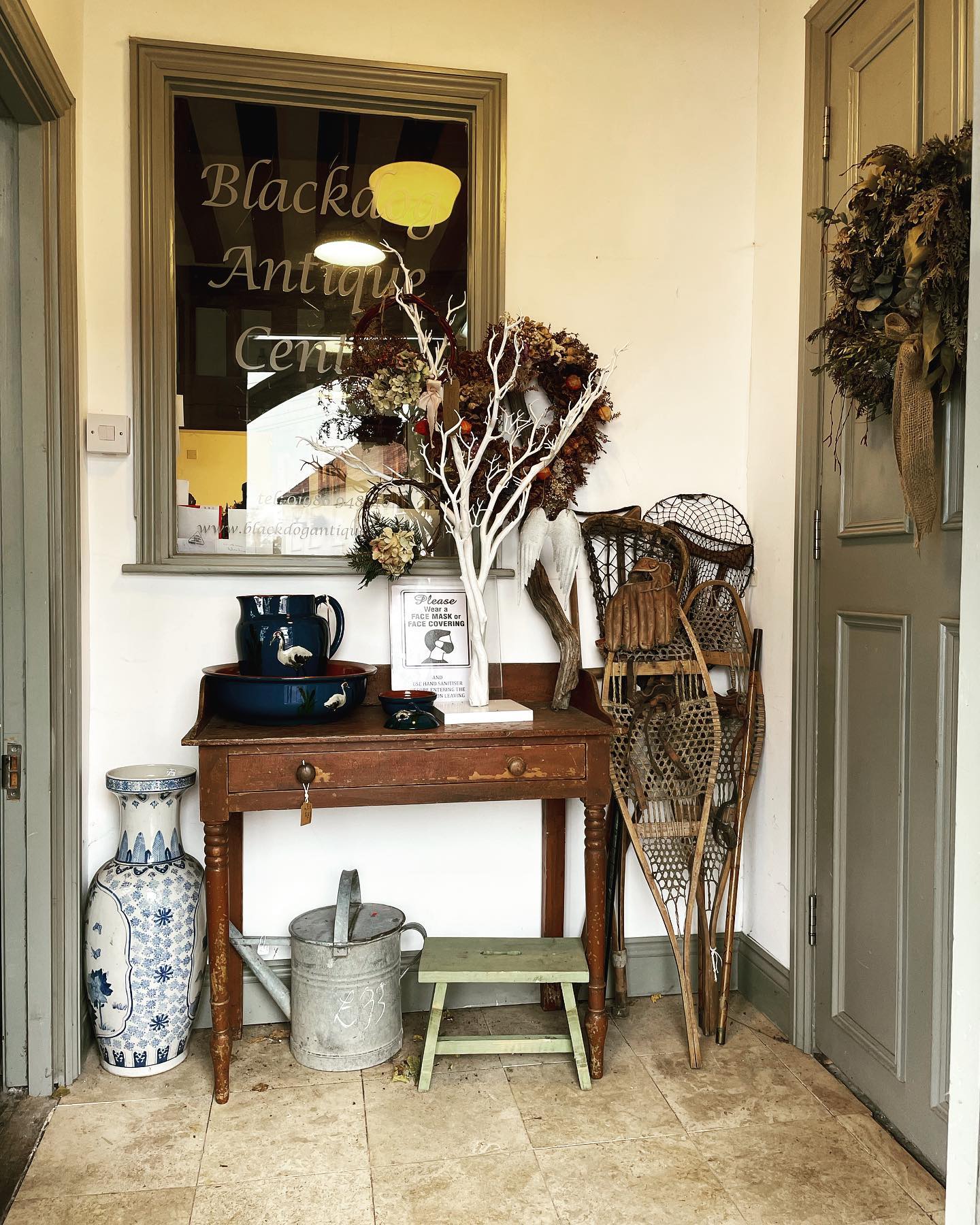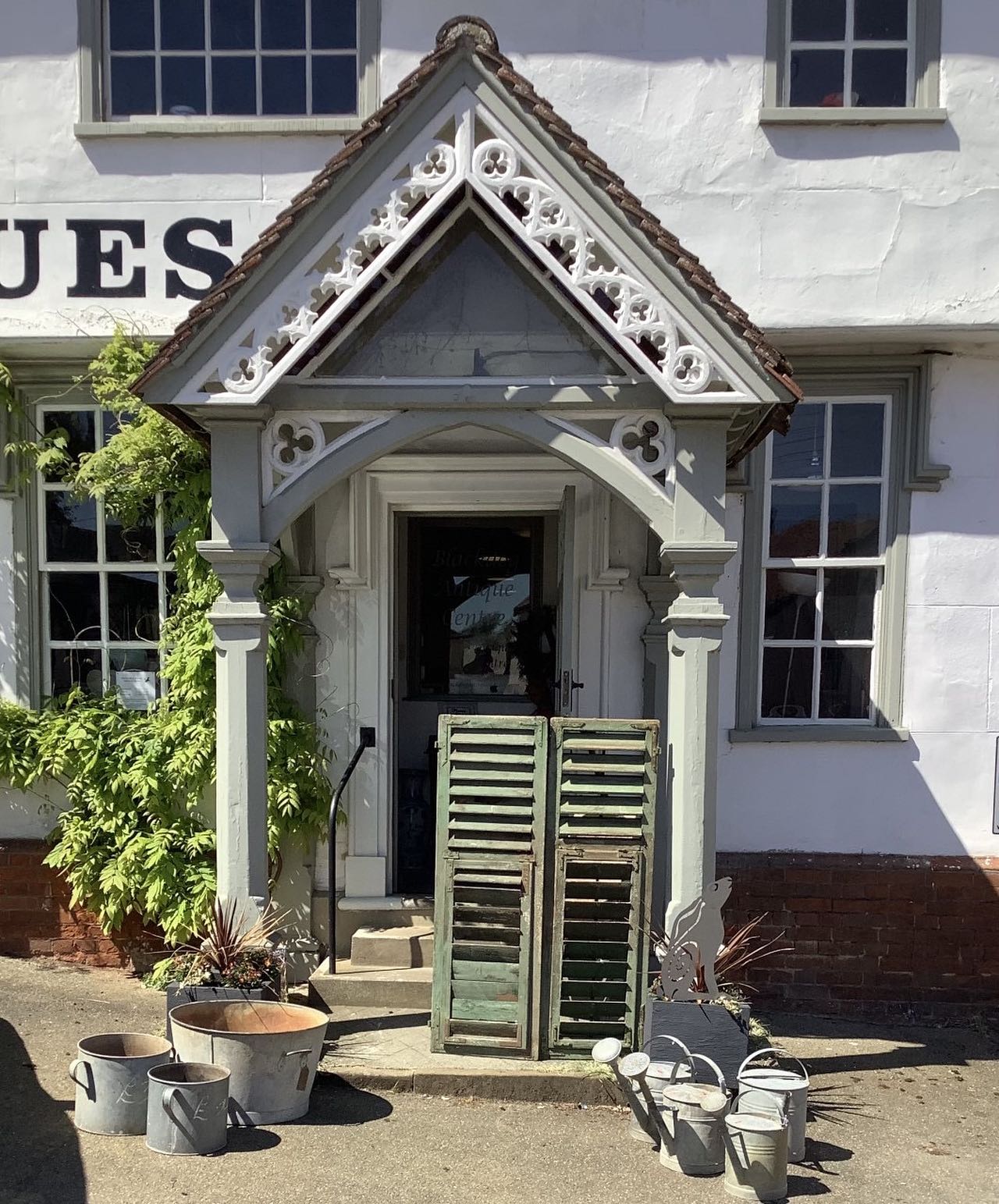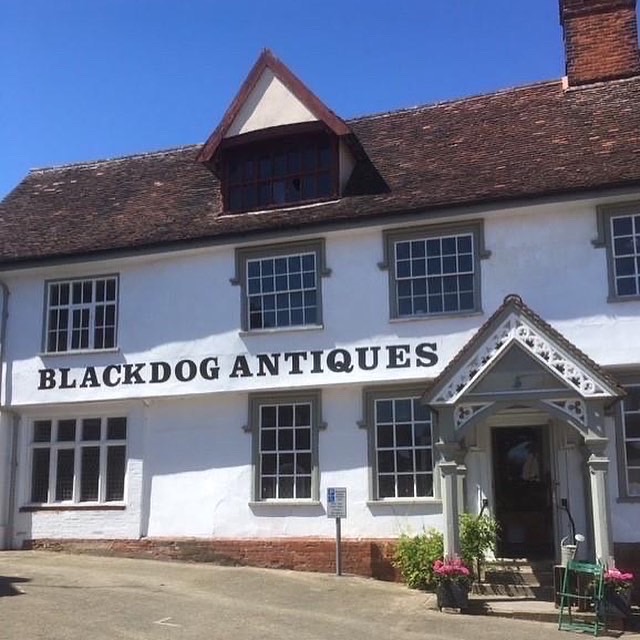Antiques Trade Talks – Blackdog Antiques
 Blackdog Antiques was established in 1984 by Mike Button and his family shortly after they moved to the Suffolk/Norfolk border from South London where they two shops selling antique pine, while buying a lot from Ireland and the continent and shipping to America. The first Blackdog Antiques shop was in Bungay, Suffolk and got its name from the ‘Black Shuck’ folklore, alongside the stuffed black dog they had in a glass case dating back to the Victorian era. The business was in Bungay for 29 years before relocating to its present premises in Halesworth, Suffolk in 2014. As well as a shop, our other company Blackdog Events was formed in 2015 starting with a monthly ‘Brocante’ in Halesworth. We now hold ten antique and vintage fairs a year across Norfolk and Suffolk, attracting 70-plus dealers at each event. Find out more at www.blackdogantiquesandvintage.co.uk
Blackdog Antiques was established in 1984 by Mike Button and his family shortly after they moved to the Suffolk/Norfolk border from South London where they two shops selling antique pine, while buying a lot from Ireland and the continent and shipping to America. The first Blackdog Antiques shop was in Bungay, Suffolk and got its name from the ‘Black Shuck’ folklore, alongside the stuffed black dog they had in a glass case dating back to the Victorian era. The business was in Bungay for 29 years before relocating to its present premises in Halesworth, Suffolk in 2014. As well as a shop, our other company Blackdog Events was formed in 2015 starting with a monthly ‘Brocante’ in Halesworth. We now hold ten antique and vintage fairs a year across Norfolk and Suffolk, attracting 70-plus dealers at each event. Find out more at www.blackdogantiquesandvintage.co.uk

What is the unique appeal of antiques?
There is something very special about antiques, be it a beautiful Georgian chest of drawers, a piece of silver, a book, picture or textile – you just know it has a story to tell. Most importantly, you know it was built to last and stand the test of time. Antiques, like all things, come in and go out of fashion and prices change accordingly, At present you can pick up some beautiful pieces of period furniture at knock-down prices, and the glory of antiques is that when want a change you can always sell. While you might not earn a profit on it, at the right price there will usually be somebody willing to buy it.
What areas/items are currently selling well?
At present, midcentury pieces are very on trend as is anything ‘French’, although, sadly, a lot of pieces being labelled as French are actually from Eastern Europe.
Which are the ones to watch/future sellers?
As previously said midcentury continues to do well as does rustic country pieces. Vintage jewellery, textiles and emphemera can be still be bought and are worth keeping an eye on.

What antiques do you have at home/collect and why?
The only modern furniture at home is really the white goods, the rest is antique including a beautiful half-tester bed and some lovely, small Georgian chests of drawers. Collection-wise…… clocks, we have quite a few and a collection of studio pottery.
What do you think will be the antiques of the future?
Pieces that are well designed and stylish and made from quality materials, this goes right across the spectrum.
How is the industry changing and are you optimistic for its future?
I think the biggest change is the decline in independent antique shops with more dealers either selling in antique centres or just selling at fairs and online. Antiques will always have a future but it is cyclical and while it is challenging at present it will get better.
Is new technology good for the trade and buyers/collectors?
Absolutely. The advent of the internet has made research so much easier and while it feels like many old-time dealers are being dragged screaming into the 21st century more are realising the benefits of mobile card machines at fairs. The mobile also works well if somebody has something to sell. We ask them to send us photos via their mobile and straight away you can see whether it is going to be of interest and it saves a lot of time on both parts.

Tell us some trade secrets?
Do your research, ask question and buy what you like.
What antiques/artworks would you buy if money were no object?
Probably more studio pottery, Lucie Rie and Hans Coper being favourites.
You’re down to your last 50 quid – what antiques/art would you buy?
Something that I liked and I thought could turn a profit. It might be a few items or you blow the lot on one piece as long as you can see a profit in it and have enough left for a bottle of wine!

Alongside your fairs, where are your favourite antique hunting destinations and why?
Obviously running fairs does give us access to 70-plus antique and vintage sellers all in one place, which is why if you are just starting out, antiques fairs are a good place to go. Having a shop means we get quite a few things brought into us and also our online presence means people also contact us with items they have for sale. Visiting new areas always means checking out the antique shops and centres. We are also due to go on a buying trip to France in the next few weeks.
What are some of the biggest mistakes that buyers make – what questions should they ask?
 Offering a dealer half the price an item is priced at, this is where the antiques programs on TV have done the trade no favours. Most dealers will be happy to give some discount but you are usually looking at 10%. The thing to remember is that it is the dealer’s living and they do need to make a working profit. However, we are really trying to move away from the automatic discount that seems to be expected and in the shop any discount given is a mere token. Most dealers will have a minimum spend per item before discount is even considered.
Offering a dealer half the price an item is priced at, this is where the antiques programs on TV have done the trade no favours. Most dealers will be happy to give some discount but you are usually looking at 10%. The thing to remember is that it is the dealer’s living and they do need to make a working profit. However, we are really trying to move away from the automatic discount that seems to be expected and in the shop any discount given is a mere token. Most dealers will have a minimum spend per item before discount is even considered.
Dealers are usually happy to answer questions and share what they know about a particular piece, but one question not to ask is: ‘Where did you get it from?’. Few will want to share their source, be it a shop, fair or online site.
What do you consider the high point of your career in antiques?
At the beginning of my career in antiques doing clock repairs for the artist John Bratby who had the most amazing collection of antique clocks, later being able to acquire some good quality named suffolk longcase clocks. I have also had some good auction finds which have gone on to more specialist auctions. The biggest high point is probably getting to work with some of the best characters in the trade; somewhat mad but sharp as nails! For me, it’s a charmed life and not one I would ever swap.
Are antiques attracting younger buyers and, if not, how can the industry reach out to them?
Not as many as I’d like, but it is encouraging to see younger buyers looking at how they might be able to adapt pieces to fit their home and others who want to furnish their homes with individual pieces that work well alongside contemporary furnishings. Many are realising the value for money antiques give.
What advice would you give to people new to antiques who want to learn more?
Buy what you like, think about how much you want to pay and do as much research as you can on the style or period that you are interested in.

